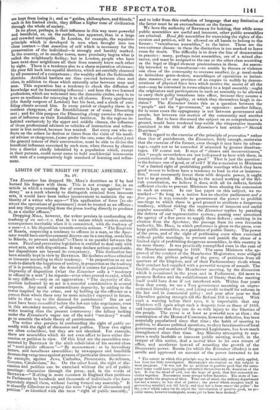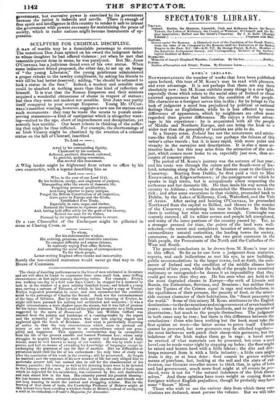LIMITS OF THE RIGHT OF PUBLIC ASSEMBLY.
No. IV.
THE Examiner has dropped Mr. Miss.'s doctrines as if he had burned his fingers with them. This is not strange : for, in an article in which a running fire of sneers is kept up against " ten- dency " as a mark whereby to distinguish criminal from innocent acts, it would have been rather inconvenient to maintain the au- thority of a writer who says—" This application of force [to ob- struct the operations of government] must be treated as an offence ; and any thing proceeding from the press tending directly to produce it, as a similar offence."
Dropping MLLL, however, the writer persists in confounding the tendency of an act—i. e. that in its nature which renders certain consequences inevitable when it is committed, with the tendency of a man—i. e. his disposition towards certain actions. "The Emperor of Russia, suspecting a tendency to offence in a man, as the Spec- tator would have our Government discern one in a meeting, sends him to Siberia, to prevent mischief."—There is no parallel between the cases. Penal and preventive legislation is entitled to deal only with overt acts, not with dispositions. It may declare actions punishable, but dispositions are beyond its competency. This distinction has been steadily kept in view by BENTHAM. He declares actions criminal or innocent according to their tendency. "In proportion as an act tends to disturb the happiness of society, in proportion as the tendency of it is pernicious, will be the demand it creates for punishment." Depravity of disposition (what the Examiner calls a "tendency to offence in a man") he regards—even when proved to exist, which is very difficult—only as an aggravation : "The depravity of dis- position indicated by an act is a material consideration in several respects. Any mark of extraordinary depravity, by adding to the terror inspired by the crime, and by holding up the offender as a person from whom there may be more mischief expected in future, adds in that nay to the demand for punishment." But an act !mist have been committed before the law can take cognizance, even in this secondary manner, of disposition. This question has a wider bearing than the present controversy : the fallacy lurking under the Examiner's vague use of the word " tendency " would go to unsettle the whole theory of punishments. The writer also persists in confounding the right of public as- sembly with the right of discussion and petition. These two rights are often coincident, but they are not identical. For example, there are assemblies which do not even affect to have either dis- cussion or petition in view. Of this kind are the assemblies enu- merated by BENTHAM in the sixth subdivision of his second class of "semi-public offences "—" By menacement : as by incendiary letters, and tuniultuous assemblies; by newspapers and handbills denouncing vengeance against persons of particular denominations— for example, against Jews, Catholics, Protestants, Scotchtnen, Gascons, Catalonians," &c. On the other hand, the right of dis- cussion and petition can be exercised without the aid of public meetings: discussion through the press; and, in the words of BENTHAM—" Nothing is more common in England than petitions to Parliament by hundreds and thousands of individuals who have separately signed them, without having formed any assembly." It is absurdly Lllacious to employ the term "rights of discussion and petition" as identical with the term "right of public assembly,"
and to infer from this confusion of language that any limitation of the latter must be an encroachment on the former.
We have the authority of BENTHAM for holding, that while some public assemblies are useful and innocent, other public assemblies are criminal. Bond fide assemblies for exercising the rights of dis- cussion and petition, will be allowed on all hands to belong to the former; "tumultuous assemblies," to the latter. These are the two extreme classes : in them the distinction is too marked to leave room for doubt. The difficulty is to draw the line of demarcation in practice : many, perhaps most assemblies, are of a mixed cha- racter, and must be assigned to the one or the other class according as the legal or illegal element predominates in them. An assem- bly intended to be tumultuous—to enable by threats or violence one class of the community to overawe another, (e. g. meal-mobs to intimidate grain-dealers, assemblages of operatives to intimi- date masters,) or one province of an empire to nullify by demon- strations of physical force laws which receive the assent of all the rest—may be convened in terms adapted to a legal assembly : ought the originators and participators in such an assembly to be allowed to carry their guilty intentions into effect, because they assume a transparent veil of legality, at which they themselves laugh in de- rision? The Examiner treats this as a question between the "people" and the "government," as opposites : another fallacy, for in some cases the oppugnancy is not between government and people, but between one section of the community and another section. But to have discussed the subject on so comprehensive a ground, would have rendered impossible the vituperative inuendo contained in the title of the Examiner's last article—" Slavish Doctrines."
With regard to the exercise of the principle of prevention* rather than that of punishment, the Examiner, fairly enough, maintains that the exercise of the former, even though it may have its advan- tages, ought not to be conceded if attended by greater disadvan- tages. Of course not. It says of "abuses and inconveniences," that "people nevertheless are not indisposed to bear with them, in consideration of the balance of good." That is just the question : is the balance one of good, or of evil ? If the concession to Ministers "of a limited right of prohibiting public meetings which they have good reason to believe have a tendency to lead to riot or insurrec- tion," must necessarily invest them with despotic power, it ought not to be granted. But, looking to the actual working of the Bri- tish constitution, we believe it does, with all its defects, furnish sufficient checks to prevent Ministers from abusing the concession to such an extent. In our last paper on this subject, we re- marked—" So long as a nation has an elective parliament and a free press, it may concede to government the power to prohibit meetings to which there is good ground to attribute a dangerous tendency, without risking the suppression of innocent and useful popular assemblies." To this the Examiner replies by parading the defects of our representative system; passing over unnoticed the agency of a free press to supply these defects ; omitting in its citation from the Spectator, the passage from its own favourite authority, Mr. MILL, in which preference is given to the press, over large public assemblies, as a guardian of public liberty. The power of the press, and of the right of petitioning even when exercised without public meetings, to prevent and punish the abuse of a limited right of prohibiting dangerous assemblies, in this country is no mere theory. It was practically exemplified even in the case of the Manchester meeting in 1819. The same Ministers who ap- proved of the conduct of the Manchester Magistrates, were obliged to endure the pitiless pelting of the press, of petitions from all quarters of the kingdom, and of their Parliamentary rivals whom their conduct had supplied with a powerful weapon of assault. The forcible dispersion of the Manchester meeting, by the discussion which it occasioned in the press and in Parliament, did more to promote Reform and the establishment of liberty than the meeting itself could have done if not interfered with. Within four years from that event, we see a Tory government assuming an unpre- cedented liberality of tone, and taking credit to itself for reforms in the law and in commercial policy : and year after year we find Liberalism gaining strength till the Reform Bill is carried. With such a warning before their eyes, it is improbable that any Ministers will again adopt such a despotic tone as those of 1819, and impossible that they can do so with injury to the liberties of the people. The press is at least as powerful now as then ; the constitution of the House of Commons, however defective, has been materially popularized since that time ; the habit of meeting to petition, to discuss political questions, to elect functionaries of local government and members of the general Legislature, has been much strengthened since that time. Any Ministry attempting to sup- press a really laudable or innocent public meeting, would, in the temper of this nation, deal a mortal blow to its own tenure of office, and accelerate instead of retarding the growth of the Democratic power. Russia (to which the Examiner alludes) is not servile and oppressed on account of the power intrusted to its The extent to which this principle may be beneficially and safely applied, has been too little investigated. BENTHAM', observation on this subject is most pregnant. "It was not for an addition to positive good that the untu- tored many could have originally submitted themselves to the dominion of the few. It was the dread of evil, not the hope of good, that first cemented so- cieties together. Necessaries come always before luxuries. The state of lan- guage marks the progress of ideas. Time out of mind, the military department has had a name; so has that of justice: the power which occupies itself in preventing mischief, not till lately, and that but a loose one—' the police ': for the power which takes for its object the introduction of positive good, no pe- culiar name, however inadequate, seems yet to have been devised." giovernment„ but excessive power is exercised by its government because the nation is imbecile and servile. There is enough of free spirit and intelligence in this country to render it safe to intrust the government with powers necessary for maintaining the peace of society, which in ruder nations might become instruments of op- pression.



























 Previous page
Previous page